#narrator essay
Text
The Character of the Stanley Parable's Narrator
Alternative Title: Why the Narrator is my baby girl. My boyfriend. The love of my life if you will. My wife even. So beautiful.
Note: This is the Preamble.
Spoiler Warning: (FINISHED)
I think if you’re reading this, you probably know the Stanley Parable in at least a basic regard. As in like you know the gist of the game and you know the Narrator. I would say be careful if you do not want spoilers but talking about the game at all is a spoiler. As well as such, it’s required for me to go into spoiler territory to fully analyze the Narrator, so please keep that in mind while reading. You might see an ending you didn’t play or even knew existed.
Introduction of the Narrator’s Role and Gaming: (FINISHED)
Before we particularly start on his specific personality, we need to understand the role he plays that make the Stanley Parable the way it is. If his name was not enough of an indicator, he is a narrator and more specifically; an omniscient third-person Narrator. This type of narrator knows and sees all; they know the exact motivations, beliefs, and internal dialogue of the characters in the story. This narrator type fulfills the similar essence of a deity. Narrators in fiction contribute heavily to the story, as they’re a common way for the audience to understand the situation the characters are experiencing. The Stanley Parable subverts this idea by having the audience fulfill the role of the main character, with the Narrator being forced to adapt to the unpredictable wants of the player.
We see him as that type of narrator if the player follows the exact story the Narrator lays out for them. However a fairly common way people play video games is experiencing the world themselves, without any restrictions or guidelines. So normally, the player doesn’t see him as an omniscient third person narrator; rather an interactable being they can piss off. This lays out a specific difference between modern video games and written literature. Video games are expected to be adaptable to specific playing styles, where written literature is expected to have a focused/contained narrative. If a video game is unadaptable and rigid, it becomes tiring to the player and would require a hefty reward for them to keep playing. A common criticism for most AAA games is how they go under the facade of being open world but directly forcing the player to go in the directions the developers want them to take. If written literature has a confused or unclear narrative, it becomes difficult for the reader to keep their suspension of disbelief. The usual response if the narrative is all over the place and incoherent, is wondering if the writer has ever read a book.
This difference between the two mediums is crucial for the game’ conflict to work effectively as it does. The Narrator represents the expectations of written literature from the reader with everything else representing the expectations of video games from the player. The Narrator is written as rigid and unadaptable and Stanley is designed to be capable of the opposite. This could also explain the aura of poshness surrounding the Narrator, as reading literature had always been associated with the high-class and sometimes pretentiousness; even in the modern era. Additionally, narrators in fiction are expected to be authoritative; having enough knowledge to explain the story to the reader. This could be potentially noted how the Narrator has a voice that can be described as older and mature. This is why unreliable narrators invoke a strong feeling for the reader; as it forces them to be distrustful of authority. At least for a short moment. By contrast, the common expectation for gamers is to understand the story in their terms; without being told by a disembodied voice. And yet…
The Stanley Parable exists and the game is incredibly popular for being an indie title. Looking up ‘popular indie games’, you get a list where the Stanley Parable is right next to all the other big fellas.
Giving a slight glance at YouTube, you can see the first result when you look up the game garnering around twenty-three million views. It would be too easy to say “it’s because of Markiplier”, but he has played the original game before and the most popular video of the original has only 6 million views. There is certainly a more recent, specific niche the Ultra Deluxe version filled, while the original game did not; at least not as efficiently. As such, I will be analyzing the most iconic facets of the Narrator in the Ultra Deluxe version since we see this character in more perspectives. There is something special about the game that is more than simply the additional content. It may be because you get to hear the Narrator’ smooth voice more but that might just be how the Narrator acts as a character. Also noting here, I will be talking about Sad-ist’s Clock 0ut at some point but for me to have this essay be sort of organized; I’m gonna write about it somewhere else. (Note: I tried to make a Clock 0ut essay but that never happened; sorry)
List of Endings and General Observations / TL;DR for some of the endings (Work In Progress)
The Freedom Ending
“He had won! He had defeated the machine!” - The Narrator
Narrator as a Character: Pure Omniscient Third-Person Narrator
Notes: It’s an interesting contradiction that the only way Stanley gains “freedom”, is when you obey every word and direction the Narrator says. As beautiful as this ending is, it's also deeply ironic.
The Countdown Ending
“After they kept you enslaved all those years, you go and you try to take control of the machine for yourself, is that what you wanted? Control?” - The Narrator
(Kevan Brighting did not need to go hard with the monologue. He did though, and I love it)
Narrator as a Character: Antagonist
Notes: Ever since I saw this ending + the Jack short film, it’s really fun to imagine a horrific edge to the Narrator. It’s cool as hell. The fact the Narrator’s voice borders on sounding like Brighting’s actual talking voice, actually makes him sound more intimidating.
The Museum Ending
“When every path you can walk has been created for you long in advance, death becomes meaningless, making life the same. Do you see now? Do you see that Stanley was already dead from the moment he hit start?" - The Female Narrator
Narrator as a Character:
Notes: If I heard more of the Female Narrator, I’d probably be as attracted to her as I would with the Male Narrator (Bisexual moment).
The Broom Closet Ending
“OH, DID U GET THE BROOM CLOSET ENDING? THEB ROOM CLOSET ENDING WAS MY FAVRITE!1 XD' ... I hope your friends find this concerning.” - The Narrator
Narrator as a Character:
Notes: It’s funny as hell
The Apartment Ending
“This is a very sad story about the death of a man named Stanley.” - The Narrator
Narrator as a Character: Pure Omniscient Third-Person Narrator
Notes:
Not Stanley Ending (or the Real Person Ending)
“Wait a second, did I just see... no, that's not possible. I can't believe it. How had I not noticed it sooner? You're not Stanley. You're a real person.” - The Narrator
Narrator as a Character:
Notes: I like how the ending shows a clear difference between the player and Stanley; and players still feel like Stanley in some of the other endings.
Zending Ending (or the S*icide Ending)
“If we just stay here, right in this moment, with this place... Stanley, I think I feel... happy. I actually feel happy.” - The Narrator
(God I just want to stay in that place for him and sleep gently with him in my arms. I feel so bad for him. I want him happy and comfortable.)
Narrator as a Character:
Notes: Hold up brb *cries in the shower*
New Content Ending
“If this is new content then I could just read you the entire dictionary, there's 20 hours of new content right there!” - The Narrator
Narrator as a Character:
Notes: I'd kill someone in cold blood to hear him read the entire dictionary
Skip Button Ending
“You constantly have to stop doing anything so the narrator can catch up with his long-winded explanations of what's happening. I wish there was a skip button.” - Cookie9’ bullshit review
Narrator as a Character:
Notes: God they really made my babygirl suffer in silence, desperately begging Stanley to not skip any further; losing his mind as more time slips by
The Sequel Ending
“So forget this Ultra Deluxe nonsense! I say we take it one step even further. Which is why I'm very proud to announce, for the first time ever, The Stanley Parable 2!”- The Narrator
Narrator as a Character:
Notes: I love how this ending was barely an allegory for half-hearted attempts at releases of the once beloved games. How games corporations want franchises so badly, they pump out soulless nostalgia to their audience. Like it’s not subtle at all but I love the honesty.
The Figurines Ending
“It's just - it's those figurines. Those Figleys. I haven't stopped thinking about them since you nabbed every last one.” - The Narrator
Narrator as a Character:
Notes: I love how excited this old British man gets when he's talking about the Figley Wiggleys. He's such a babygirl
(07/16/23: Why tf did I write this???)
Little Clarification before I go Balls Deep (The Player =/= Stanley) (FINISHED)
In this essay, I will analyze the Narrator’s personality as well as how he interacts with other characters; but basically just Stanley. However I perceive Stanley and the Player as different entities, so this is here to explain my thought process. So Stanley is purely a fictional character and is in at least two layers of being controlled; by both the Narrator and the Player. The Player is not fictional and can decide to have Stanley follow or disobey the Narrator. Despite the Player being the main cause of Stanley’s actions, the Narrator reprimands and rewards Stanley as if his actions are of his free will. Example; the Player chooses to put Stanley in the Countdown Ending, where the Narrator believes Stanley did it on his own accord. Aside from the Real Person Ending, the Narrator has no clue that Stanley is controlled by the Player. The Player is different from Stanley but the Narrator is unaware of this. So, I’ll write Stanley and the Player as different people in the context of the Narrator. I hope that makes sense because without knowing the game, you’re probably gonna be very confused. Especially when I talk about the Real Person Ending.
(Additional Note: The section about the difference between The Player and Stanley is how I made my self insert. Nothing too cool; I just thought it was neat.)
#〽️💛#proship dni#f/o blog#tsp narrator#selfship community#selfship#the stanley parable#tspud#narrator essay
9 notes
·
View notes
Text
An unfortunate intruder. [Blank Scripts AU]
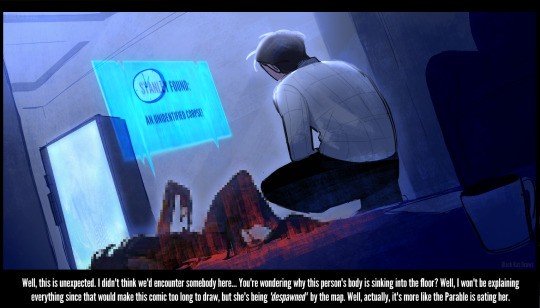
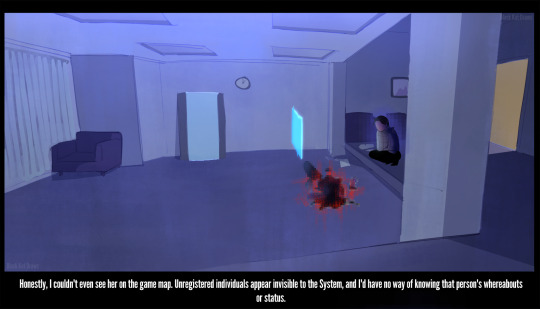
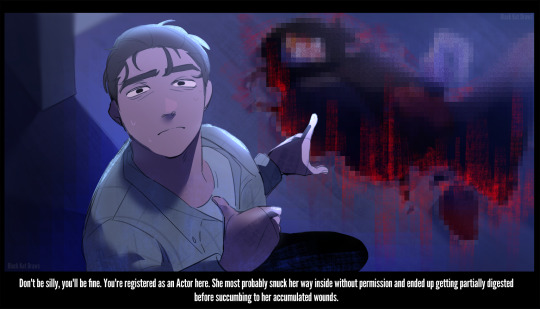
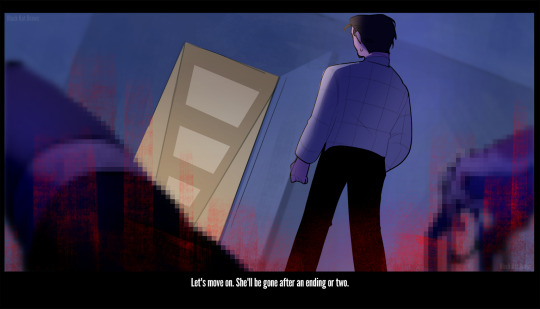
The Parable is a living organism. Similar to a tree in a way.
Unless an individual is registered as a Guest [or an Actor in Stanley's case], the Parable will begin to digest anything organic that enters inside of it.
Food will clip through the Parable until they fully 'despawn'.
Permission to enter can only be granted by The Narrator [Black].
The woman found here snuck inside and got digested by the Parable.
#tsp blank scripts au#huzzah a lore drop#I cannot for the life of me just share lore normally noooo i need to make a comic or animation about it#because come on whos gonna stop and read an essay nowadays#I love the few people that do take the time to read what I write down though#ignore the fact that the drawing quality decreased with each panel teehee i was in severe pain#tsp au#stanley tsp#tsp stanley#narrator tsp#tsp narrator#tspud#tsp#the stanley parable ultra deluxe#the stanley parable
644 notes
·
View notes
Text
one of my favourite underrated moments is when beloved tells fitz how bee is their love-child and fitz is trying to rack his brain for when he had sex with the fool. LIKE, rote is a romcom actually

#‘is rote canonically gay?’ bro. there’s mpreg in this series#rote#realm of the elderlings#fitzloved#fitzchivalry farseer#f&f spoilers#fitz and the fool#fitz and the fool spoilers#rote spoilers#‘fool!! we never had sex!!… or did we…’#fitz I could write essays on at least two times I’m like 90% you and beloved got down and dirty and you blocked it from the narrative#ily my idiot unreliable narrator
170 notes
·
View notes
Text
I think people sleep on this moment in the Odyssey...
If I'm wrong, not getting full context, or see something that isn't there, feel free to give evidence to explain why.
Here he crept under a pair of bushes, one an olive, the other a wild olive, which grew from the same stem with their branches so closely intertwined that when the winds blew moist not a breath could get inside, nor could the rain soak right through to the earth.
(Book 5, Rieu)
I think this is about Penelope and him.
Obviously, their marriage bed is made from an Olive tree. If it's just about Athena then why are there two mentioned? Why did Homer mention two when he could've just said he took refuge under one? Or a completely different type of tree? Why mention them being intertwined?
One an olive: Penelope, who has been with society and "safe" in Ithaca ("Safe" because of the suitors)
One wild: Odysseus, who has dealt with literal monsters and immortals and has just escaped from Calypso. Literally naked and filthy, a "wild man".
"which grew from the same stem with their branches": Them both being together at first, before being separated.
"so closely intertwined that when the winds blew moist not a breath could get inside, nor could the rain soak right through to the earth.": Despite being separated, they are still "intertwined". Whether you want to think of it as them being likeminded or simply connected, even though they are apart, nothing could get in between them. 🥺
I don't know what else Homer could be referring to other than them.
#It's funny to me as even though she's not always mentioned when he retells his tale to the Phaeacians. The narrator mentions her CONSTANTLY#Because even if Odysseus doesn't say it. He's thinking about her often#honestly I...I don't think it COULD be anything else but I'm sure people will be mad that the simp loves his wife. 🤷#This part is the reason why I mention them calling the bed their “nest” as that's what THIS part calls it too. and I find it really cute#It was a nest where he SHOULD have stayed in with his family but no... :'D#half-empty nest😞#also it could be him comforting himself??? He's been forced to be in beds he doesn't want to be in for YEARS#Now. he's free and while it's not “fancy”. but at least it's SOMEWHAT like his own#greek mythology#tagamemnon#odyssey#the odyssey#penelope#odysseus#odypen#odysseus and penelope#odysseus x penelope#Mad rambles#shot by odysseus#essay
222 notes
·
View notes
Text
being in the slay the princess fandom has taught me why people feel the need to gatekeep pieces of media previously considered to be "niche." not that it's good, but i understand now. i can handle people mischaracterizing all these other characters but if anyone out here did so to any of the slay the princess characters, i might just have to pace around my room and scream for a solid hour or two.
#slay the princess#i don't want to jinx it but i haven't really encountered anyone in the fandom with the average media literacy and reading comprehension#every other show has. it's refreshing to be surrounded by people who are smarter than me for once like genuinely.#the stp fandom is a huge inversion of the typical modern fandom mo typically with how shifty and the narrator are treated but that's a#different topic i think. someone else has already made a good essay on this but i don't remember their url sadlh
76 notes
·
View notes
Text

a brief comparison of compleately different medias that rewired my brain. yes i'm aware the target audience of this post is me only.
It was supposed to be a joke but I can’t do anything casually so a more vaguely detailed analysis under the cut.
spoilers for all three obviously but vague spoilers about themes and not plot points. i could have gone more in the specifics but it's late and i don't want to fall in this rabbit hole right now i need sleep.
If you strip these stories of all the cool visuals and funny jokes, if you take away their narratives with the world about to end, you're left with pure, naked, vulnerable love that is such a core essence of any of these characters. Love is what can destroy or save the world. Love is what drives the heroes forward. Love is what keeps them from dying.
I think all three stories are about being loved and accepted for who you are. Even if you've changed and you don't like yourself, even if you've stayed the same and you don't like yourself.
They're about tearing yourself apart, throw up, slashing yourself open in front of the one you love. Let them see everything, the bad and the gross and asking "do you still love me?".
They're about enduring, sacrificing yourself, everything, sacrificing the world, God, the entire universe for the one you love.
They're about trusting to choose each other over and over again, everytime, in every universe, even if the next time you see me I may not be what you remembered. Even if you don't recognize me.
They're about eating, gnawing, cannibalizing each other over and over and over in a mutual exchange of obsession.
They're about carving your own peace when you don't even know what peace it's supposed to be like
They're about grief and loss and learning to be whole again.
They're about submitting oneself to the horrifying oredeal of being known in order to allowing the reward of being loved.
It's about "it's rotten work" and answering everytime without esitation "not to me, not if it's you"
#also all fanficion are technically canon in each of these lmao#foggy thoughts#the locked tomb#good omens#slay the princess#griddlehark#ineffable husbands#love#it's always about love in the end#go and tlt are more similiar in the sense of superficial similiarities being both bible gays and all#go and stp are similiar in the more worldbuilding and backstory way both eternal beings with a love so eternal we cant even comprehend it#but tlt and stp?#the similiarities are so visceral i feel like they narrate the same exact concept of love#a love so evershifting and multifaced#also obviously where tlt has cannibalism as a love methaphor stp has killing#theres something so beautiful having such vile acts rapresent something so pure as love#insert that south park clip “hope everyone enjoyed that” “no randy only you did” “that was pretty much my target audience anyway”#if i spoke fluent english i'd make a cool 2 hours video essay on youtube about this
126 notes
·
View notes
Text
james somerton made the only video essay i’ve ever seen on sk8 and was it good? idk i literally can’t remember but from what ive read from searching those terms just now,, no it was bad
so yeah ok it’s fine that that ones gone but like SOMEONE PLEASE MAKE A VIDEO ESSAY ON SK8 preferrably someone who has actually watched and loved the show
thnx i will be watching when you do <3
#man if i liked doing research i’d make such a killer video on sk8#but i like doing reserch about as much as james somerton does but i have morals soooo#sk8 the infinity#james somerton#hbomberguy#id narrate the hell out of a sk8 video essay#but i don’t want to write it#hmm i bet that’s what james somerton said right before making all of his videos
61 notes
·
View notes
Note
What is murderbots and why should I read/listen
The Murderbot Diaries is a sci-fi series by Martha Wells mostly taking place in a dystopian capitalist future. Basically, the viewpoint character is a company-manufactured private security guard rented out to the managers of space! company towns.
After hacking its governor module, nothing much changes about its life for several years until a routine job turns deadly and it's forced to trust a group of humans with its secret in order for any of them to survive.
First paragraph:
I could have become a mass murderer after I hacked my governor module, but then I realized I could access the combined feed of entertainment channels carried on the company satellites. It had been well over 35,000 hours or so since then, with still not much murdering, but probably, I don’t know, a little under 35,000 hours of movies, serials, books, plays, and music consumed. As a heartless killing machine, I was a terrible failure.
Synopsis aside, the books are fast-paced, fun, and hopeful; and Kevin R. Free has great voices for all the characters.
If you liked the Imperial Radch series, speculative sci-fi relevant to our current late-stage capitalism problems, or are a fan of non-human perspective in fiction, Murderbot is for you.
#Murderbot#I feel like I'm writing a high school essay#read Murderbot cuz its got guns in its arms and is touch avoidant but will raise its body warmth while carrying its humans to safety#read Murderbot because that petty unreliable narrator would die for you#I have 157 legit audiobooks but only revisit about 25 of them and this series is on the regular rotation for work background noise
150 notes
·
View notes
Text
i cannot describe the rage i feel when i click on a fight club deep dive youtube essay, and it’s just… some dude, talking about how this film is the purest portrayal of masculinity and how “men love it because it’s so relatable”.
i mean, i love it because it’s relatable. but not in the way those sigma film bros do.
i love it because i’m gay, hate capitalism and would like to recreationally get beat up.
#why must i always get betrayed#the titles always sound so promising#and then they just spout this unreflected bs#like… don’t you know what satire is? ☹️#if y’all have video essay recs that aren’t dumb men talking stupid send them my way pls#i started watching a german one today and couldn’t make it thru the first 3 minutes#how do they misinterpret everything????#fight club#the narrator#tyler durden
143 notes
·
View notes
Text

Unskippable cutscene.
#our art#lineart#in stars and time#siffrin#odile#depictions of us#the liveblog ends up looking like this in a few loops we think. once siffrin has the time to realize their new passenger WILL NOT get tired#and WILL be continuing to narrate their life for the entire rest of the liveblog#face of a man who is in the time loops and keeps being forced to listen to essays about their own trauma
25 notes
·
View notes
Text
it's so disappointing that i can't read korean. i would love SO much to look around and see if korean orv fans have any good essays on the work but I DON'T SPEAK THE LANGUAGEEEEE
#narrates#orv#this is so sad i BET theres such good essays. i BET.#but unfortunately i am stuck solely with like. me and the six other english speaking orv fans who like writing analytic posts
34 notes
·
View notes
Text
"i thought you were a older 20s gay man!" that's sweet of you considering i look like i organize goth slam poetry events for "thems & femmes" and like my name is Clare or Willow or something
#and i sound like i should narrate steven universe discourse essays#listen i don't pick or choose my face or voice so didn't have a say in this but id be stupid to pretend i don't appear how i appear#and how i appear is pretty goofy#mine
39 notes
·
View notes
Text
The Main Character.
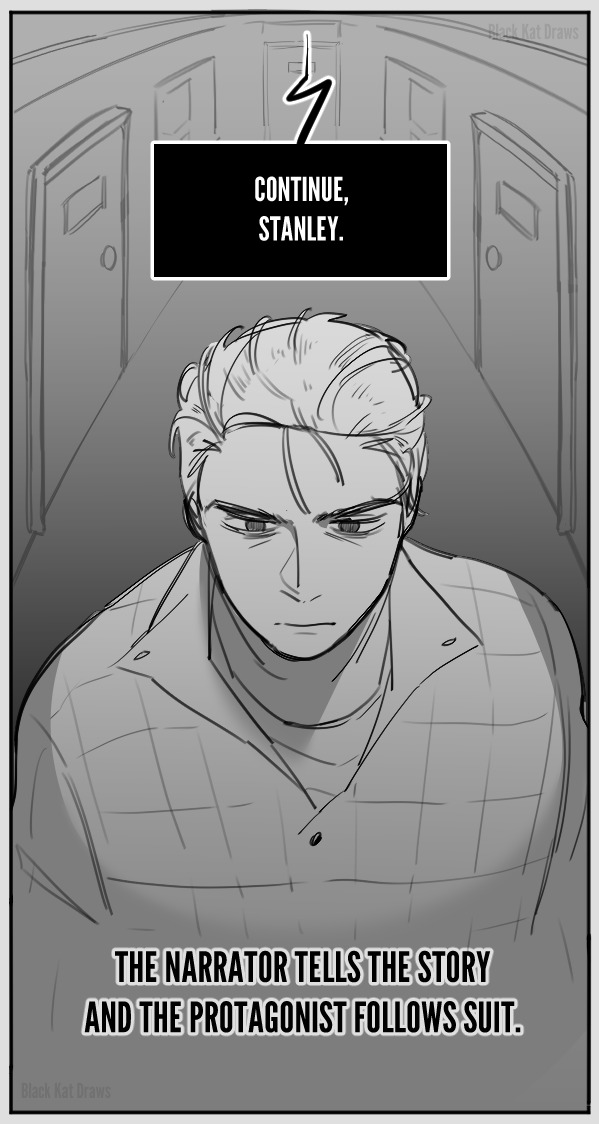
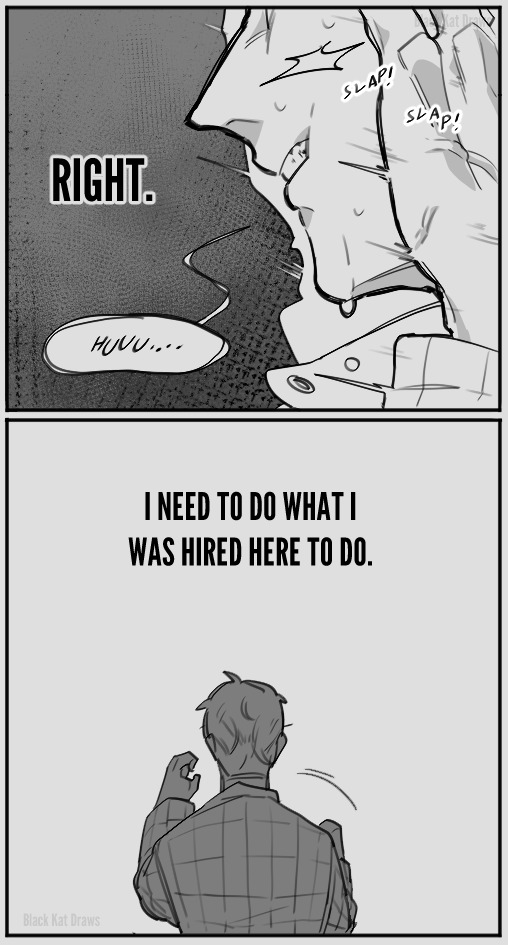
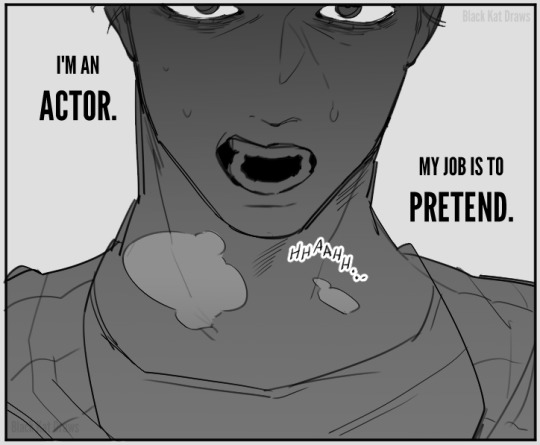
[Blank Scripts AU]
#take a look at his shounen genre anime/manga acting ahh#okay small talk in tags (im gonna start spouting entire essays at you)#i personally think the TSP community dont give me enough content with Stanley as the main character#like yall are fr missing out#guys think about it#rather than focusing on the narrator (who's basically the equivalent as a high-leveled entity comapred to Stanley)#wouldnt focusing on the weaker person seeing the world filled with unknown monsters be more fun?#because you get to explore the story alongside him#since Stanley is just as clueless as you are#and compared to the already powerful beings#you actually get to see Stanley grow and progress#(I mean this is just me giving yall a prompt lmao dont take this personal yo I just really like Weak to Strong tropes)#(I dont really care-)#(-yall have fun with your stuff man :)#tsp blank scripts au#tsp au#the stanley parable#the stanley parable ultra deluxe#tsp#tspud#tsp narrator#narrator tsp#stanley tsp#tsp stanley#my drawing museum
437 notes
·
View notes
Note
I am in awe and saluting you always for the rate at which you post fics. truly admirable 🫶
That's very good to know, because I kinda assume people are mentally throwing rocks at me. Opening ao3 like "awgh fuck it's THAT GUY again"
#i can't help it. i'm a professional historian (VERY writing-heavy) and that interacts with my specific brand of audhd#and now if i don't write at least 5k words a day i'm walking around my house narrating essays to myself. this is better for all of us
23 notes
·
View notes
Text
portraying zombies as an ultimately evil race with no nuance whatsoever is one of the worst things the fandom has ever done
#like ive literally seen ppl evil-lize the zombies to the top of a parabola where all of them r cruel and mean and r like imperialist fucks#graveyard talk shift#i thank god the fandom evolved a bit from that narration because like. portraying/making a race that inherently evil just. stinks#im not going to go on a huge essay but honestly i needed to share it
20 notes
·
View notes
Text
We LOVE a mysterious lady while waiting for Hazbin Hotel’s marvelous first season to wrap up. Let’s talk about Lilith and Eve!
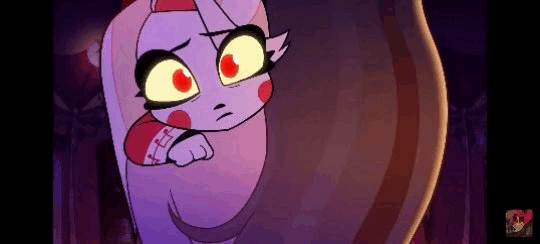
There’s so many ways this could go. Applause to Vivienne and Co. for making this fun with what I am sure are ample red herrings. I hope those involved in the show are having great chuckles as we feverishly wonder what is really going on.
First, some groundwork so that we’re on the same page. I’m nearly certain Sera is not the highest up in Heaven, whether in order or entity. This may be the common “God sleeps, knows all, and refuses to be involved”, which is always a fun, good move for narratives. Orrrrr, it might be some of my theories.
And on the subject of narratives, we should acknowledge that Charlie is telling her parents’ perspective of the beginning of Earth. It may not be the whole story, people may be figurative or portrayed inaccurately, and things may have been omitted.
Now then, my 6 theories!
Theory 1 - Eve is just a regular woman, and no one cares about her after death. High probability that Adam had a lot to do with that.
Theory 2/3 - Eve is God / Eve is the true evil
Let me tell you some ancient religion things. Nothing in this world is isolated. In ancient Judaism, there are references to Asherah, a Canaanite mother goddess and wife to the big god El, particularly as an object of devotion in the form of a tree. Makes sense that the Judeo-Christian God would have a wife if Lucifer does.
Anywho, whether or not this is the inspiration, I wonder if the imagery used in the first scene of the show is meant to hint at the origins, or roots, of evil in the world being an actual enemy. Whatever twist would happen with Eve (or Lilith!) finally appearing, I would expect it to be BIG like this, and the symbolism adds up.
Theory 4 - Eve is Lilith
During the opening sequence, Eve about to eat the apple takes on very similar features to Lilith’s silhouette just seconds later.
This theory goes with the understanding that Eve never existed, or also ran away from Adam but became inconsequential. We never see Eve or Adam as humans again in this sequence, so for all we know this works. Eve could definitely just be symbolic.

Theory 5 - Eve and Lilith are Allies
They are working together on… something. Whatever Lilith and Alastor are connected with, for sure. Perhaps these ladies are triple agents and are infiltrating their respective realms quietly while plotting some sort of takeover or revamp. Perhaps there is a bigger evil / God himself that they are trying to steal power from?
Theory 6 - Lilith became Eve 7 Years Ago
Something happened where Eve was hurt, usurped, or otherwise incapacitated, and Lilith stepped in to prevent a power vacuum. Obviously this can work well off of Theory 5, but it works as an enemy simply taking advantage, too.
BONUS Theory 7 - Lilith and Lucifer are Allies
Once again, they’re working together on something nefarious. Eve may be the baddie (or goodie) or not even matter, whilst our royal Hell couple has supposedly split up to give the idea they aren’t in communication, and that Lucifer is a non-threat.

I am so glad that we have 2 seasons from the start! There’s so many other thoughts and so much in this show, that at least 2 seasons is definitely needed. To the season finale!
#analysis#hazbin hotel essay#Hazbin hotel#lilith#Eve#Hazbin Lilith#Hazbin Eve#do we have unreliable narrators?#who’s the big bad we haven’t seen yet?#all this and more on Thursday
19 notes
·
View notes